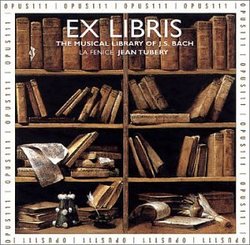| All Artists: Girolamo Frescobaldi, Johann Michael Bach, Johann Pachelbel, Johann Adam Reincken, Johann Rosenmuller, Charles Dieupart, Johann Sebastian Bach, Johann Joseph Fux, Dietrich Buxtehude, Tomaso Albinoni, Andre Raison, Nicolas de Grigny, Jean-Henri d'Anglebert, Jean Henry d'Anglebert, Ensemble la Fenice Title: Ex Libris: The Musical Library of J. S. Bach Members Wishing: 1 Total Copies: 0 Label: Opus 111 Release Date: 3/12/2002 Genres: Special Interest, Classical Styles: Opera & Classical Vocal, Chamber Music, Forms & Genres, Short Forms, Suites, Toccatas, Historical Periods, Baroque (c.1600-1750), Classical (c.1770-1830), Instruments, Keyboard, Strings Number of Discs: 2 SwapaCD Credits: 2 UPC: 709861303236 |
Search - Girolamo Frescobaldi, Johann Michael Bach, Johann Pachelbel :: Ex Libris: The Musical Library of J. S. Bach
 | Girolamo Frescobaldi, Johann Michael Bach, Johann Pachelbel Ex Libris: The Musical Library of J. S. Bach Genres: Special Interest, Classical |
Larger Image |
CD Details |
CD ReviewsChapeau! Notre Kantor Jean Sebastien Bach! Giordano Bruno | Wherever I am, I am. | 02/10/2009 (5 out of 5 stars) "There's no denying that the French have some catching-up to do in their appreciation of Johann Sebastian Bach. The simmering Catholic/Protestant antagonism and the nationalistic rivalry of France and Germany have enforced the idea that only Germans (and possibly Anglo-Saxons) can perform Bach authoritatively. Check the listings; you'll find evidence of what I mean. Even the guest artists with the Bach Collegium Japan are almost always Teutonic.
Jean Tubery has an agenda in this supremely Gallic performance of music "from Bach's library", which is to situate JS Bach in his international milieu. The first CD begins with Frescobaldi and proceeds to establish the dominance of Italian influences in the music of Bach's Germany. The composers include Johann Rosenmüller, Johann Fux, Johann Michael Bach, Johann Pachelbel, and Johann Reineken, along with two small chorales by Johann Sebastian himself. These guys have more in common than their first names; they are all practitioners of the Italian ricercare and heirs of the Italian 'second practice' founded on basso continuo. The second CD also begins with an Italian, Tomaso Albinoni, and then turns to the works of French composers André Raison, Nicolas de Grigny, and Jean-Henri d'Anglebert, all of whom were known to Bach and appreciated by him. Johann gets the last notes on CD II, with three organ compositions that show French accents. There is something ineffably French about Tubery's Bach, as there is about the Bach CD produced by Gerard Lesne that I reviewed a few weeks ago. Tubery's rendition here, with the instruments of La Fenice and with German-born organist Hans-Jörg Bötticher, is less distinctive, less startling than Lesne's. It isn't so surprising to hear Dieupart and Buxtehude sounding Gallic after all... until you stop and realize that if Bach's contemporaries were cognizant of French styles, wouldn't Bach himself have shown some appreciation of them! Tubery's supremely 'vocal' cornetto is supported on this recording by the graceful trombone of Stefan Legée and the gymnastic baroque bassoon of the improbably-named Jérérmie Papasergio, along with baroque violin and cello. Their ensemble is a tight delight. These two CDs, however, are dominated by keyboard music; the French selections are all either for organ or harpsichord. Bötticher shares the disk with the relaxed virtuosity of harpsichordist Laurent Stewart. The 'discovery' tracks, for me, are the very eloquent toccata for harpsichord by JA Reineken and the potently Bachian cantatas by JS Bach's father's cousin Johann Michael Bach. But the showpiece, the chef d'oeuvre, is the Buxtehude Ciaccona "Quaenadmodum desiderat cervus" for voice and obbligato instruments. No agenda matters in the least when listening to the rich tenor of Hans Jörg Mammel and the preternatural virtuosity of Jean Tubery on cornetto. This is a composition worth the whole price of the 2 CDs." |
